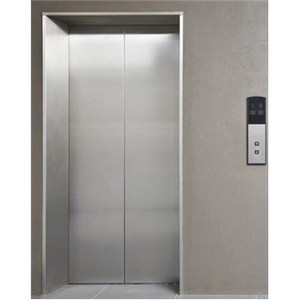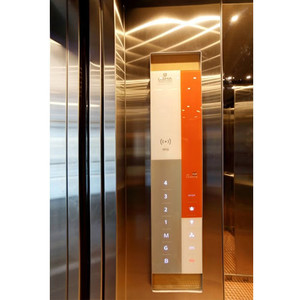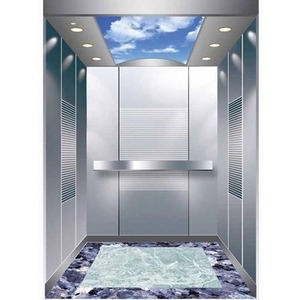(1554 products available)






















































































































































































There are three main types of Otis elevators. They are the passenger elevator, the freight elevator, and the hydraulic elevators. Below is a discussion of the different types of Otis elevators.
Passenger Otis elevators
The passenger elevator is one of the most popular types of Otis elevators. As the name implies, this elevator is designed to transport passengers. It is commonly used in buildings such as hotels, malls, and residential homes. It features a spacious elevator cab that can accommodate many people. The elevator also has safety features like emergency stop buttons and handrails. It is designed to transport people between floors safely and smoothly.
Freight Otis elevators
The freight elevator is a type of Otis elevator that is designed to transport goods and materials. It is commonly used in warehouses, factories, and commercial buildings. The elevator cab is very strong and has a high weight capacity. This allows it to carry heavy loads of goods. The freight elevator is also fitted with sliding doors. The doors make it easy to load and unload goods, and they are more durable than traditional doors.
Hydraulic Otis elevators
The hydraulic elevator is a type of Otis elevator that uses a hydraulic system to move the elevator car. The hydraulic system consists of a pump, a cylinder, and a piston. The pump is responsible for pushing hydraulic fluid into the cylinder. As the fluid fills the cylinder, it pushes the piston, which in turn moves the elevator car. This system is commonly used in low-rise buildings. It is more cost-effective than the traction system. It is also easier to install and maintain. The hydraulic elevator is a popular choice for residential homes and small commercial buildings.
The following are some of the important features and functions of Otis elevators:
Smart Elevator Technology
The elevator system uses a high-tech system that is very intelligent. This system helps to make sure that the elevators are used in the best way possible. Also, it helps to reduce how much energy is used.
Elevator Control System
The control system for the elevator is advanced. It allows for smooth and quick stops. Also, it makes sure that the elevators are safe and reliable.
Energy Efficiency
Otis elevators are designed to use very little energy. Some of the elevators even recycle energy. This recycling can help to save up to 75% of the energy that is consumed.
Safety Features
These elevators have a lot of safety features. For instance, there are emergency brakes, sensors, and alarm systems. These features help to make sure that passengers reach their destinations safely.
Ride Comfort
Otis elevators ensure that passengers have a good experience when they are riding. The rides are very quiet. In addition, they are smooth and stable.
Customization Options
These elevators can be changed and customized to fit different needs and preferences. There are many different sizes, designs, and finishes to choose from.
Remote Monitoring
The elevators can be monitored from a distance. This helps to ensure that they are functioning properly. It also allows for any problems that arise to be fixed quickly.
Maintenance Solutions
Otis elevators provide unique maintenance solutions. These solutions make sure that the elevators are always in good working condition. They also help to reduce downtime and increase their lifespan.
Cabin Customization
The elevators have a cabin that can be customized to meet different needs. This includes adding advanced lighting, touch panels with glass accents, and mirrors.
There are several scenarios where elevators are used in all kinds of buildings. Some of the scenarios include:
Scenario 1: High-Rise Office Buildings
High-rise office buildings often use elevators to transport employees and visitors quickly and efficiently between floors. For example, a 50-story office building may have multiple banks of elevators, each equipped with advanced hydraulic elevator technology, to ensure smooth and timely access to all levels of the structure.
Scenario 2: Residential Skyscrapers
Skyscrapers used as residential homes for many people also use elevators. These elevators help residents and their guests get to their apartments quickly. For example, in a tall apartment building with 40 floors, elevators would be necessary for people living on the top floors to get to the ground floor and vice versa.
Scenario 3: Hospitals
Hospitals use elevators for different reasons. One important reason is to help move patients from one place to another in a building or between buildings. For example, if someone is very sick and needs help, elevators would be required to transport them to a different area within the hospital quickly.
Scenario 4: Museums
Museums, which are places that show art and other important things, also use elevators. These elevators help move heavy items, like artwork or historical objects, between floors. Sometimes, these pieces of art are very heavy and fragile, so they need special help to get lifted and moved carefully.
Scenario 5: Shopping Malls and Supermarkets
Shopping malls, which are places with many stores, and supermarkets, which sell food and other things, use elevators to help customers move between floors. Sometimes, people buy big things that are hard to carry, so they need an elevator to help them get it to their desired floor.
Scenario 6: Hotels and Hospitality
In hotels, which are places where people stay when traveling, elevators are very helpful. For instance, when guests arrive, they usually have suitcases and bags. The elevators would be required to assist them in moving their belongings from the ground floor to their respective rooms on higher floors. Additionally, if guests want to eat at the hotel restaurant on a different floor, they can use the elevator to get there easily.
When selecting the ideal elevator for a building, several factors must be considered. These include the features of the elevator, its energy efficiency, its capacity, the customer service of the vendor, the quality of the elevator, and the warranty. The price of the elevator will also be impacted by whether it is a freight or passenger elevator.
The features of the elevator should be looked at to see if they match the requirements of the building and the expectations of the occupants. Certain elevators will have advanced technology that will move the elevator car more quickly between floors. Some may have features that will use energy more efficiently. Advanced safety features will be available with some elevators.
The efficiency of the elevator's energy consumption should be looked at closely, as this will impact the operating costs of the elevator. Vendors will provide eco-efficient solutions, which are the best choice when it comes to energy consumption.
When looking at the capacity of the elevator, it is important to consider the number of people or the weight of the goods that will be moved up and down the building. The size of the elevator car will be determined by this. The Otis Gen2 elevator, for example, can carry a weight of up to 1,800 pounds.
The customer service of the vendor should be examined before making a purchase. An elevator that is chosen will be in the building for a long time, so it is important to select a vendor that will be able to provide assistance when needed. Look at the reviews of the vendor to see what other customers have experienced.
The warranty on the elevator will also impact its price. A longer warranty will mean that the vendor has more confidence in their product and will be providing the customer with peace of mind. Look at the terms of the warranty and what it covers.
Freight and passenger elevators are very different. A passenger elevator is one that is used to move people between floors, while a freight elevator is used to transport goods. Freight elevators are built to carry heavy loads, while passenger elevators are designed to transport people quickly and safely.
All in all, the most important thing to remember when buying an elevator is that it is a long-term investment. Make sure to do the proper research before making any decisions.
Q: What is the price of an elevator?
A: The elevator price varies widely depending on several factors, such as the building height, the number of stops, and the elevator type. As mentioned, the elevator for sale in the market comes in different types and sizes, and each type is designed to serve a different purpose. For instance, a freight elevator will cost differently from a hydraulic or passenger elevator.
Q: How long does it take to install an elevator?
A: Usually, an elevator takes anywhere between 3 to 6 weeks to be installed. However, the installation period can take longer depending on the building structure and the type of elevator being installed.
Q: How often should an elevator be maintained?
A: Ideally, the elevator should be inspected and maintained at least once a month. Proper and regular maintenance of the elevator is important as it helps ensure the safety of the passengers, prolongs the lifespan of the elevator, and improves its functionality.
Q: Do elevators require a machine room?
A: Not all elevators require a machine room. For instance, a machine room-less elevator, as the name suggests, does not require a machine room. Usually, the machine room is located close to the elevator shaft. The machine room is also where the control panel, elevator system, and other important components are installed.